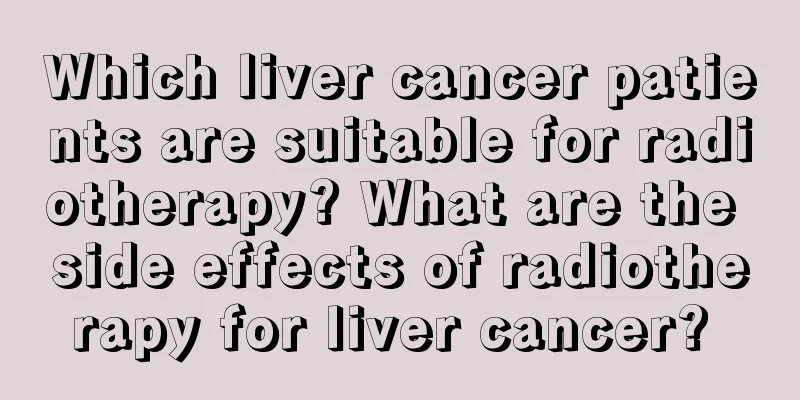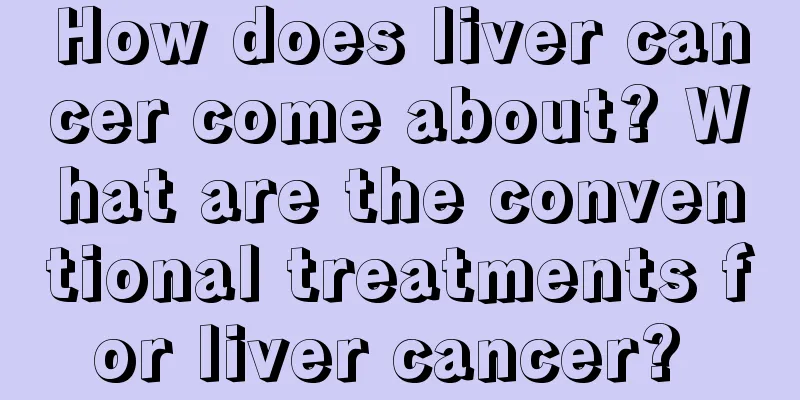Which liver cancer patients are suitable for radiotherapy? What are the side effects of radiotherapy for liver cancer?

|
Liver cancer can be treated through interventional methods, which are minimally invasive. Diagnosis and treatment can be completed only through insertion of blood vessels. There is very little pain, and it causes no trauma or very little trauma to the body. As long as the intervention is successful, there will be obvious effects, and the positioning is relatively accurate. Which liver cancers can be treated with radiological intervention? Which liver cancers are suitable for radiological interventional treatment? Radiological intervention is suitable for patients over 40 years old with liver cirrhosis and liver cancer. For patients with chronic liver disease or liver cirrhosis, if the liver cancer lesions are confirmed and limited to the liver, no matter how large the size of the mass is or how many there are, radiological intervention can be used for treatment, so that all lesions in the liver can be found. If the patient is relatively young, the blood vessels are easy to be recanalized, that is, when new blood vessels grow, collateral circulation will be formed, taking away some iodized oil, and the effect of embolism will disappear; if there is no cirrhosis, young people have strong regenerative ability, and new blood vessels will appear in about 20 days. For patients over 40 years old with liver cirrhosis, the effect of embolism lasts for 2 to 3 months and can be treated with radiological intervention. What are the side effects of radiotherapy for liver cancer? 1. Fever Fever after interventional surgery is mainly caused by ischemic necrosis and absorption of tumor tissue or secondary infection. The body temperature is generally not very high, but will be maintained at around 38°C. The body does not have any discomfort and does not require any special treatment. As long as the patient drinks more water regularly, it can be relieved to a certain extent. 2. Gastrointestinal reactions Some gastrointestinal reactions are mainly caused by the toxic side effects of anti-tumor drugs. Some other embolic agents will reflux into the duodenum and gastric blood supply arteries, causing a gastrointestinal reaction. The main manifestations are vomiting, nausea, abdominal pain, etc. in postoperative patients. Some delayed reactions mainly include stress ulcers and gastrointestinal bleeding. 3. Abdominal pain and bloating Abdominal pain and distension after interventional surgery are mainly caused by the tumor tissue being damaged, which leads to edema around it. The liver will become larger and larger, and the pain caused by pulling the liver capsule will not last long, generally lasting about 3 to 10 days before disappearing. As the tumor tissue ischemic and necrotic, the volume becomes smaller and smaller, the edema around the tumor tissue will disappear, and the pain will gradually subside. If the pain is severe, you can use analgesics for symptomatic treatment under the guidance of a doctor. 4. Damage to organ function Embolization therapy may damage human cells and tissues, causing excessive increases in some functional enzyme systems. The levels will reach their peak within 1 to 5 days after the treatment and return to normal within three weeks. Kind tips If liver cancer patients undergo radiological interventional treatment, they must choose the right indications, protect liver cells, and prevent complications. They should try to choose a hospital with better equipment. The treatment is relatively safe during the operation and is relatively short in duration. They should avoid being too nervous and go to the hospital for regular checkups to prevent recurrence and metastasis. |
<<: What are the typical early symptoms of lung cancer? Three typical early symptoms of lung cancer
Recommend
Will osteosarcoma heal on its own?
In today's society, osteosarcoma is a disease...
Swelling and pain around nails
Pain around the nails is a problem that many pati...
How to solve the problem of liver enlargement caused by drug-induced hepatitis
If drugs cause hepatitis and the liver becomes en...
Has osteosarcoma ever been cured?
Osteosarcoma can be cured, but the treatment effe...
What are the symptoms of esophageal cancer
Esophageal cancer troubles many friends and bring...
I coughed up blood half a month after cardiac radiofrequency ablation and was diagnosed with lung cancer. What should I do?
If a patient coughs up blood half a month after u...
What are the postoperative care for brain cancer?
The best time to treat cancer is the early stage ...
Can I eat Korean ginseng half a month after lung cancer surgery?
Whether or not you can eat Korean ginseng half a ...
What medicine should I take for dry throat and phlegm
One of the symptoms of body heat or inflammation ...
What are the diagnostic methods for lung cancer? Several commonly used methods for diagnosing lung cancer
Lung cancer is one of the malignant tumors with t...
What are the typical symptoms of cervical cancer
What are the typical symptoms of cervical cancer?...
How does osteosarcoma occur?
Osteosarcoma is a tumor that occurs on the bones ...
What are the causes of toothache
There are many reasons that cause tooth pain. If ...
Is fresh Gastrodia elata poisonous? It turns out this is the truth
Gastrodia elata is a traditional Chinese medicine...
What Chinese medicine is good for kidney deficiency and liver fire?
A body with kidney deficiency will actually make ...









